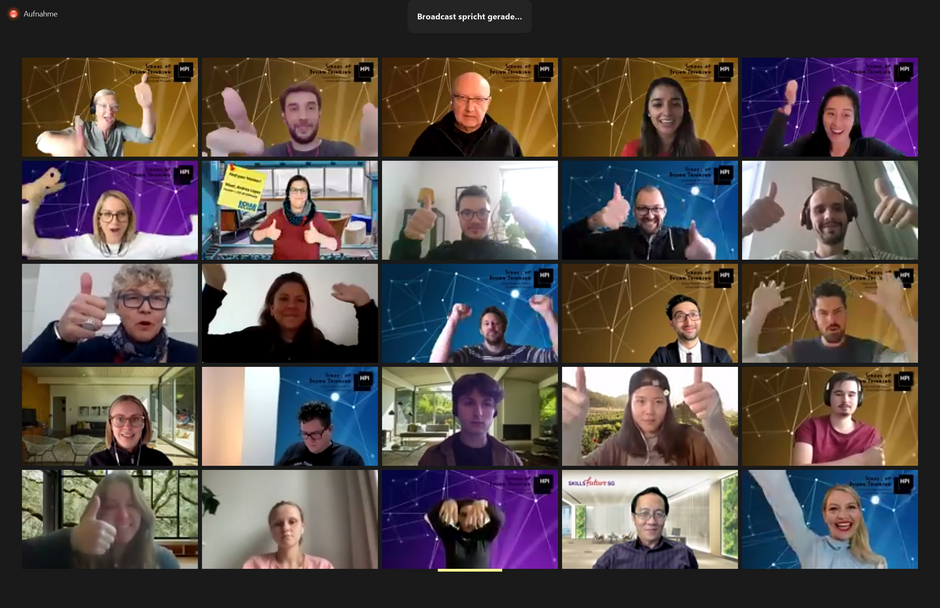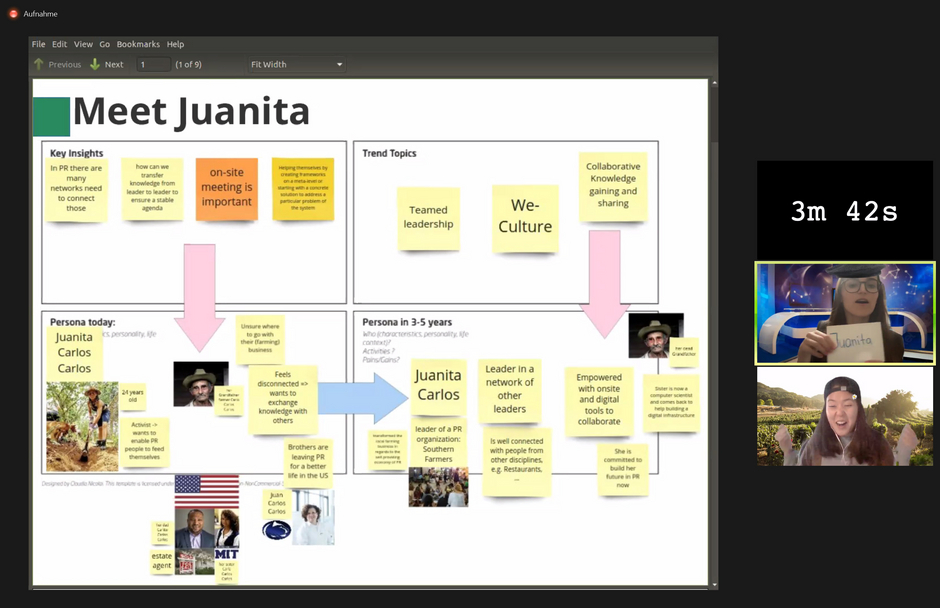Global Design Thinking Workshop: Creating digital opportunities for young entrepreneurs in Puerto Rico
From September 1st to 30th, the HPI D-School hosted the Global Design Thinking Workshop “Strategic Design: From Human-Centered Design to Strategic Futures” in cooperation with our project partners People-Centered Internet, GMU’s Center for Resilient and Sustainable Communities (C-RASC), and Echar Pa’Lante. Six international student teams worked on a design challenge about creating digital opportunities for young people in Puerto Rico by applying a strategic approach of Design Thinking to create desirable futures. This involved a new strategic approach to design thinking that combines Human-Centeredness with the Futures Thinking approach developed by Dr. Claudia Nicolai to develop ideas for so-called desirable futures.
How can we connect communities with digital tools and enable young entrepreneurs to thrive? How can we build strong connections amongst neighbors and store owners, schools and caretakers, citizens in general that are not dependent on the government but created and sustained by people from the communities?
At the Global Design Thinking Workshop, 30 international participants explored this issue in an intense deep dive into a complex design challenge: “Design resilient networks in and between communities as in Puerto Rico by supporting individual and community learning and development with digital tools and services.”
They applied a newly developed strategic approach of advancing the notion of design thinking to strategic design by Dr. Claudia Nicolai to building communities and creating digital opportunities in ways that foster self-directed learning and collective action towards resilience and a sustainable culture for growth in underserved communities.
Supported by our international coaching team, the students collaborated over the course of four weeks to develop solution ideas for our project partners, focusing on creating digital opportunities for aspiring entrepreneurs in the Caribbean Island of Puerto Rico.
From Human-Centered Design to Strategic Futures
The Global Design Thinking Workshop series always focuses on two learning aspects. On the one hand, our students worked on a team project about fostering networks between communities with the help of digital tools. On the other hand, they applied a strategic approach of Design Thinking and learned how to explore trends, build scenarios and use speculative design to create desirable futures.
Human-Centeredness is one of the key elements in the design of innovation processes. However, it is also a criticism of Design Thinking. When we interview and observe current needs of today’s users they often have difficulties to imagine life beyond their near-by futures and might not care about the long-term impact of design and consumption decisions.
In this project, we therefore work with strategic futures as we aimed to create solutions that will both work long-term and address users’ needs in the near future.
Digital solutions to support communities and their networks
After two weeks of intense work with their coaches, our Design Thinking teams shared their ideas for creating future with entrepreneurial opportunities for young people in Puerto Rico. Following their design challenge, the students developed prototypes for digital solutions to support and connect aspiring entrepreneurs with experienced businesspersons.
Some of the teams developed concepts for digital platforms for collaboration, networking and sharing, each with a different focus. The “Puerto Rican Dream platform” could serve as a crowdsourcing platform for the community, addressing problems from the ground such as teacher shortage. People could gather on the platform to develop solutions and exchange ideas. Once a year they would then meet in person at the “Dream Festival”. Another team presented a platform where people who have a specific need can connect with people from their own and nearby communities who would like to share and can help them solving their problem.
Many of the ideas presented by the teams focused on providing opportunities for mentoring for aspiring entrepreneurs who look for support and advice by experienced business people, combining digital solutions with on-site events in the communities to reach even more people. One team suggested hosting a mobile convention traveling to different regions in Puerto Rico. Young people could join near their homes and find mentors to support their business ideas in “Find your mentor” sessions. Moreover, the convention could include a showcase session presented already successful projects.
To provide an opportunity for learning and training for young people interested in becoming entrepreneurs, another team created the idea for a “Boot your life” bootcamp workshop event. Local businesses would provide a social innovation challenge for the young people who could learn about methods while solving the challenge. At the same time, they would be able to build long-term connections with fellow participants and businesses.
The project partner organizations thanked the teams, coaches and the HPI D-School team for this unique collaboration experience. “We at the People-Centered Internet initiative are proud and pleased to be part of this front running workshop bringing Design Thinking to the human architecture of the Echar Pa'lante network in Puerto Rico“, said Mei Lin Fung, Co-Founder of People-Centered Internet.
In the Global Design Thinking Workshops (GDTW) program, participants experience Design Thinking not only as a process of this life-centered approach but also deal with complex innovation problems and a creative mindset in diverse teams. We offer three different workshops with a respective focus topic, which we deepen into: 01 Strategic Design: From Human-Centered Design to Strategic Futures, 02 Designing for Global Impact, 03 Teamed Leadership. We combine the work on a concrete innovation project with reflections on a specific topic. Our learning approach is based on the concept of problem-based experiential learning. We implement this approach as a project-oriented course in which the participants collaborate with a partner organization (NPOs and NGOs, large companies, SMEs, young start-ups, social organizations and public institutions).


